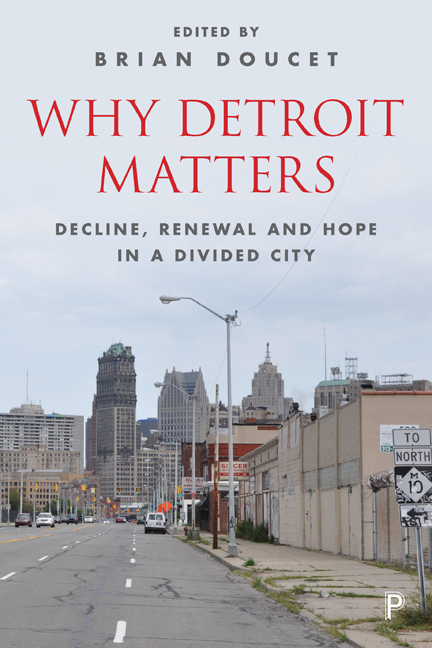Book contents
- Frontmatter
- Contents
- List of contributors
- List of figures and tables
- Acknowledgments
- one Introduction: why Detroit matters
- Section One Lessons from Detroit
- Intermezzo I You may not know my Detroit
- Section Two Practices from Detroit
- Intermezzo II My Detroit
- Section Three Conversations from Detroit
- References
- Index
twenty-six - Conclusion: Detroit and the future of the city
Published online by Cambridge University Press: 05 April 2022
- Frontmatter
- Contents
- List of contributors
- List of figures and tables
- Acknowledgments
- one Introduction: why Detroit matters
- Section One Lessons from Detroit
- Intermezzo I You may not know my Detroit
- Section Two Practices from Detroit
- Intermezzo II My Detroit
- Section Three Conversations from Detroit
- References
- Index
Summary
Listening to the voices of people like Grace Lee Boggs, it is easy to be inspired and filled with a sense of hope. Hers was a powerful voice projecting an alternative narrative to that of urban failure. The initiatives that have grown out of conversations at the Boggs Center, or through the passionate visions and tireless work of activists and community and civic groups, offer genuine alternatives for a more inclusive, fair, and socially just future. I am honored and privileged to have been able to share conversations with people like Yusef Bunchy Shakur, Malik Yakini, Sandra Hines, and the many others who are involved in initiatives that are making a real difference to Detroit and its residents.
These voices offer an alternative to the narrative that dominated Detroit for decades, that of decline and abandonment. But they also need to be placed in context. Contributions by George Galster, Ren Farley, Joshua Akers, John Gallagher, and others offer sobering reality checks as to the severity of Detroit's challenges and the inability of its current political and economic systems to tackle some of the city's biggest problems. Only by highlighting complex and diverse perspectives can simplistic narratives be challenged and the contradictions of Detroit's economic, social, racial, and political conditions be revealed.
Yet, Detroit and many other cities around the world are still portrayed in simplistic, one-dimensional narratives, which is why scholars, practitioners, and others need to continually challenge those messages by asking difficult questions and offer alternative ways of interpreting the city.
In Detroit, the dominant narrative for decades was as a metonym for urban failure. The peak of this narrative came in the years after 2008, with the global financial crisis, the US subprime mortgage crisis, and the bailout of the auto industry: Detroit's prominence as the poster child for urban decay took it to a world stage. Filmmakers, journalists, photographers, and academics from around the world put Detroit's problems into global limelight. It was in these years that numerous coffee-table books depicting the city's ruins were published (Austin and Doerr, 2010; Marchant and Meffre, 2010; Moore, 2010; Taubman, 2011), as well as films such as Detropia, which relied heavily on ruin imagery.
- Type
- Chapter
- Information
- Why Detroit MattersDecline, Renewal and Hope in a Divided City, pp. 341 - 352Publisher: Bristol University PressPrint publication year: 2017



